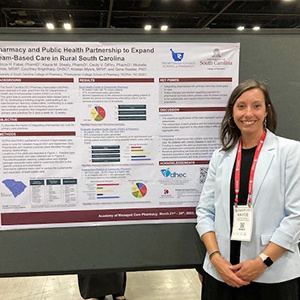The Kennedy Pharmacy Innovation Center is continuing its efforts to grow the role of pharmacists in health care settings. Their work was recently highlighted at the Academy of Managed Care Pharmacy conference as one of four posters selected for podium presentation.
This study resulted from a grant received by the South Carolina Pharmacy Association to promote and expand team-based care in the state. Patti Fabel, executive director of the Kennedy Pharmacy Innovation Center and Gene Reeder, KPIC director of Outcomes Research, along with Kayce Shealy, 2009, and colleagues from SCPhA collaborated on the study that centers around three pilot projects conducted in rural South Carolina between August 2021 and September 2022. Pharmacists were integrated into primary care practices, including a rural health center, a federally qualified health center and an independent practice, two days a week over a period of 12 weeks, to demonstrate the sustainability and impact of team-based care.
The integrated pharmacists provided care for annual wellness visits, chronic care management, comprehensive medication reviews, diabetes education, drug information, immunizations, and more.
The results of the study demonstrated that integrating pharmacists into primary care may close gaps in care for patients with chronic disease. Two of the three pharmacists were hired for full-time positions. The independent practice continues to explore ways to integrate a pharmacist by collaborating on vaccine and remote patient monitoring projects.
“We also learned that additional research and policy changes are needed regarding payment for pharmacist services within primary care for these models to be sustainable and expand beyond the Medicare population,” says Fabel. “This is the work that KPIC has done over the past few years to promote pharmacist-physician collaboration and to demonstrate our efforts to develop new opportunities for pharmacists to positively impact health care.”
Fabel hopes to generate additional supporting evidence to understand barriers to integrating pharmacists into rural health care practices.
Topics: Kennedy Pharmacy Innovation Center, Clinical Pharmacy and Outcomes Sciences, Research

